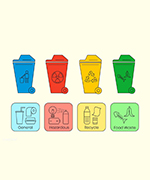Theme/Relevant Ministry:
ENVIRONMENT/ SOLID WASTE MANAGEMENT:
Karachi Metropolitan Corporation; Local Government; EPA
Project Brief:
The study aims to explore the public and private institutional structure, its weaknesses and obstacles it faces in managing the solid waste system in Karachi. Specifically, the study aims to make (1) capacity assessment of the public sector in providing the service, (2) assessment of the role of the private sector and workers managing Solid Waste formally or informally and (3) estimation of households’ Willingness to Pay and Ability to Pay for the better management of the solid waste in Karachi. For assessment purposes, the study conducted a comprehensive household survey and interviews of key players involved in the management of solid waste. The study covers all the 6 DMCs and 18 towns of Karachi. Based on the information collected from the secondary reports shared by the SSWMB and other officials of KMC, a detailed descriptive assessment is done regarding (i) generation, (ii) collection, (iii) cost of collection, and (iv) human and physical input involved. In order to explore the role of private contractors and informal players, separate interviews (KIIs) are conducted. Information collected from the private contractors not only helps us to understand the system hierarchy in managing the solid waste but also the cost and profit involved in each step – a kind of value chain analysis. The study also developed a detailed Household questionnaire to evaluate (i) the current practices in handling solid waste by household, (ii) the perception regarding the clean environment, and (iii) household willingness and ability to pay in managing the solid waste in Karachi. The study summarizes all the findings by conducting a SWOT analysis.
Public Policy Relevance:
About 12,000 tons of solid waste is generated in Karachi alone and is expected to be doubled by the end of 2020 (KCCI- 2018). The problem will further aggravate in the coming years because of a lack of appropriate planning, governance, public resources devoted to managing the problem and inefficiency at management level. The study provides policy options for efficient management of solid waste including public-private partnerships.
Status:
COMPLETED 100%
Final Research Report, Policy Brief and Journal article can be downloaded from the link: https://pide.org.pk/rasta/publications-cgp-1-0/

